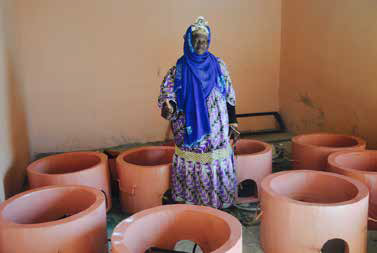
Description of the project: In Saint-Louis, Senegal, fish smoking, a women’s activity, still uses expensive, high-emitting and polluting sources of energy. This pilot project proposes a sustainable, economical and ecological energy solution for a Group of Collective Interest (GIE) consisting of 700 women fish-processors. By recovering waste from their activities through composting units (organic fertilizer) and methanization, this innovative technology brings sustainable ecological and economic benefits to a highly feminized and low value-added business sector.
Climate impact: Saint-Louis is threatened by rising waters. It is crucial to mitigate climate impacts in this region. The installation of 6 biodigestors feeding 10 cooking platforms can neutralize 12 t. of methane and 252 t. of CO2 per year. Also, wood fuel savings and the composting of halieutic by-products into organic fertilizer greatly reduces the climate footprint of this process. A wide expansion of the process is planned throughout Saint-Louis, within the framework of the National Biogas Program.
Gender impact: The project takes a gender approach from design to implementation to evaluation. The benefits are multiple: hard work (collection of wood) is considerably reduced, as well as the negative health impact of wood burning; the cost of energy decreases and the production of digestate (sold as fertilizer) creates added value; and revenues from product processing are significantly improved. In total, the project empowers 700 women workers through decent income generation and sustainable development.
Scalability / replicability: The involvement of beneficiaries in the construction and management of methanization through an autonomous management structure ensures ownership of the project and its sustainability. The economic model is viable through the sales of excessive biogas and compost, which allows long-term maintenance of the facilities. This pilot, which involved local authorities, was designed to promote the transferability of technical knowledge and the replicability of the intervention method.